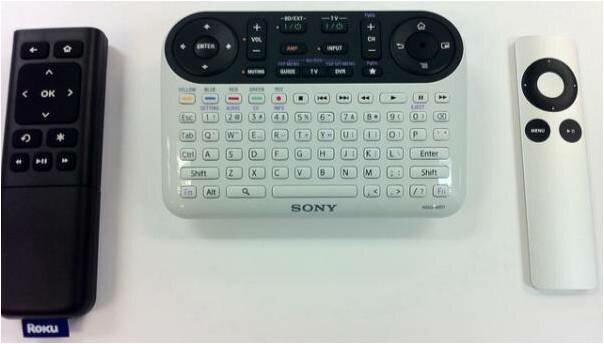In 2010 consumer appetite for IPTV was established. In 2011 a battle for openness, control and content partnerships will define this new technology
January 5, 2011 13:01 by Rachel HamiltonThe television experience is constantly changing and evolving with the increasing number of devices and platforms available to watch video content. This year two of the tech giants, Apple and Google, have seriously entered the market to make the web accessible through your television screen. However, both have very different strategies as the battle over openness and control will play out through your television sets in 2011.
How IPTV has changed in 2010
The earlier version of Apple TV was initially downplayed as only a “hobby” by Apple’s CEO, Steve Jobs [1]. However, in the current market, research by GfK NOP indicates that consumers are now not only ready, but looking, for web accessible television. Signs of early demand for TV-based applications have been demonstrated by Samsung who recently announced that it has received over one million application downloads via its internet-enabled HDTVs since their launch in March [2]. Apple is also looking to leverage the strengths of its quickly expanding content and services ecosystem [3], its well-established following and capitalise on the trend towards mobility and interconnectivity [4]. Apple has revamped its product which has been available since the end of November. Apple TV offers a simple, stylish interface which provides users with the ability to stream and rent TV programmes, films, music and photos from the web to their television sets. In this sense though, arguably, Apple has only created a new platform for the iTunes empire for music and movie buffs. But the extension and growing interconnectivity of their ecosystem is what will drive demand for this product. Apple TV will allow you to wirelessly beam video and audio from an iPhone, iPad or iPod touch, rather than relinquishing control to the set top box or TV set.
In contrast, Google, a brand driven by its extensive capabilities – has introduced the World Wide Web to the television set with ‘search’ being at the core of the proposition. The endless capabilities allow the user “to search across every channel, every app and the entire web simultaneously”[5], allowing the end-user wide exploration of content. However, this lack of focus may offer a service too complicated and impractical for the regular consumer wanting to relax in front of the television set. In addition, The Wall Street Journal recently reported that ABC, CBS and NBC are blocking Google TVs from accessing their content, due to a concern that they will lose their existing control of the broadcast business – a huge set back for Google’s aim to offer the entire video content of the web [6].
IPTV developments in 2011
A recent study by GfK NOP shows that currently 51% of internet users aged 16-65 in the UK today watch broadcast television via the internet. The ultimate question is whether those who currently use VoD on their PCs will naturally upgrade to IPTV. The research findings, to which we applied GfK’s Truth Index to help eliminate consumer overclaim, showed that in 2010, 1.86million of UK internet users intended to invest in IPTV [7]. However, those interested have not made up their minds about which solution they prefer, as interest is at similar levels for Apple, Google, TiVo and Roku. 2011 will be a key year for IPTV solution providers to communicate the benefits and use cases in order to differentiate their offer and better resonate with those consumers looking to invest.
IPTV may not be mature enough to break TV cable/satellite subscriptions yet, but there is definitely growing demand for integrating television and the internet whilst we move into 2011. It is inevitable therefore that web-based TV will eventually be cracked by the market leaders, but the question still remains as to when, and more importantly, who will, at least initially, take the lead?
[1] http://www.bbc.co.uk/news/technology-11521742
[2] http://thenextweb.com/media/2010/12/08/can-the-smart-tv-kill-the-desktop/
[3] https://gfktechtalk.com/2010/11/30/the-smartphone-market-is-there-to-be-won-in-2011-the-mobile-ecosystem-will-be-critical-to-driving-loyalty/
[4] https://gfktechtalk.com/2010/09/21/the-trend-towards-connectivity-and-mobility-is-driving-consumer-technology-renewal-and-sector-growth/
[5] http://www.google.com/tv/
[6]http://online.wsj.com/article/SB10001424052702303339504575566572021412854.html
[7] Based on a sample of 886. Research conducted by GfK NOP in October 2010.
Photo credit: J Aaron Farr (http://www.flickr.com/photos/jaaronfarr/5101103424/)
Related posts:
- The trend towards connectivity and mobility is driving consumer technology renewal and sector growth
- The smartphone market is there to be won… In 2011 the ‘mobile ecosystem’ will be critical to driving loyalty
Tags: Apple, BBC iPlayer, Consumer, Consumer Electronics, , Innovation, Internet, Internet Capable, Internet TVs, IPTV, ITV Player, LCD TVs, Research, TV


[...] This post was mentioned on Twitter by Rich Preedy, Olly Robinson and GfK NOP Technology. GfK NOP Technology said: GfK TechTalk: In 2010 consumer appetite for IPTV was established. In 2011 a battle for openness, control and conten… http://bit.ly/hPtZOZ [...]